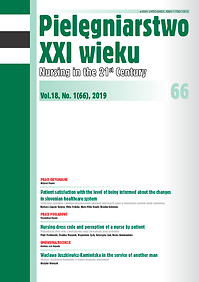Socio-demographic and work-related determinants of the social competence of professionally active nurses
DOI:
https://doi.org/10.2478/pielxxiw-2019-0006Keywords:
social competence, nursing, interpersonal skills, social skillsAbstract
SELECTED SOCIO-DEMOGRAPHIC AND WORK-RELATED DETERMINANTS OF THE SOCIAL COMPETENCE OF PROFESSIONALLY ACTIVE NURSES
Introduction. Social competence is a soft skill that allows, among other things, for better communication with the patient, establishing and maintaining a therapeutic relationship and motivation of the patient. Social competence is a guarantee of care quality and a high level of satisfaction of the patient and his or her family, when it comes to the care provided. Social competence also has a positive impact on nurses, because it is a factor protecting them from burning out, and facilitating cooperation in the therapeutic team.
Aim. The aim of the study was to assess the level of social competence of professionally active nurses as well as to determine relationship between social competence and selected socio-demographic and work-related factors.
Material and methods. The present study included 291 nurses from the economically active population, aged from 23 to 63 years. Diagnostic survey and Social Competence Questionnaire by Anna Matczak (SCQ) were used in this study.
Results. As many as 37.8% of participating nurses demonstrated high levels of social competence (7th-10th sten) in intimate situations. Average levels (5th-6th sten) were characteristic for 40.5% of respondents in social exposure situations. When it comes to social competence in situations requiring assertiveness they were typically at average level (5th-6th sten) with 39.9% of nurses fitting this score. The overall result for social competence of nurses was low (36.1% of respondents) and average (34.4%). Place of residents and the postgraduate education were among the socio-demographic factors that determined significantly higher levels of social competence among nurses.
Conclusions. Nurses represent low and average levels of social competence. There is a further need for research on social competence among nurses and implementation of training programs that will help them develop higher levels social skills.
References
1. Tomorowicz A. Struktura kompetencji społecznych w ujęciu interakcyjnym. Via Medica Psychiatria. 2011; 8(3):91-96.
2. Knopp K. Kompetencje społeczne – pomiar i aplikacja praktyczna. Ośrodek Rozwoju Edukacji. 2013. http://docplayer.pl/30188248-Kompetencje-spoleczne-pomiar-iaplikacja-praktyczna.html [data dostępu: 1.11.2018].
3. Matczak A. Kwestionariusz Kompetencji Społecznych. Podręcznik. Warszawa: Wyd. Pracownia Testów Psychologicznych Polskiego Towarzystwa Psychologicznego; 2007, s. 5-52.
4. Bandach M. Trening umiejętności społecznych jako forma podnoszenia kompetencji społecznych. Economics and Management. 2013; 4: 82-95.
5. Sternal E. Kompetencje społeczne w obliczu przemian społeczno-gospodarczych. Przegl Pedag. 2014; 2: 86-96.
6. Rutkowska K. Kompetencje społeczne – bufor wypalenia zawodowego pielęgniarek. Med. Og. Nauki Zdr. 2012; 18(4): 319-323.
7. Pereira-Lima K., Loureiro SR.: Burnout, anxiety, depression, and social skills in medical residents. Psychol Health Med. 2015; 20(3): 353-62.
8. Martowska K. Istota i uwarunkowania kompetencji społecznych. Psychologiczne uwarunkowania kompetencji społecznych. Warszawa: Wydawnictwo Liberi Libri; 2012, s. 33-70.
9. Gadecka W, Piskorz-Ogórek K, Regin K, Kowalski I. Social competence of mental health nurses. Pol. Ann. Med. 2015; 22: 105-109.
10. Zaborniak-Sobczak M, Walicka-Cupryś K, Ćwirlej-Sozańska A. i wsp.: Kompetencje społeczne fizjoterapeutów – wyniki badań pilotażowych. Post. Rehabil. 2014; 2:5-12.
11. Tyszkiewicz-Bandur M, Walkiewicz M, Tartas M, Bankiewicz-Nakielska J. Kompetencje społeczne i emocjonalne wśród studentów kierunków medycznym. Med. Rodz. 2017; 20(1): 25-30.
12. Gotlib J, Cieślak I, Zarzeka A. i wsp. Assessment of level of social skills among Public Health students of Warsaw Medical University. Eur J Public Health. 2017; 27: 380-85.
13. Mroczek B, Wolińska W, Kotwas A, i wsp. The risk of job burnout among medical workers on the basis of their work-related behaviors. Fam. Med. Prim. Care Rev. 2018; 20 (1): 29-35.
Published
Issue
Section
License
Copyright (c) 2019 Authors

This work is licensed under a Creative Commons Attribution-NonCommercial-NoDerivatives 3.0 Unported License.




